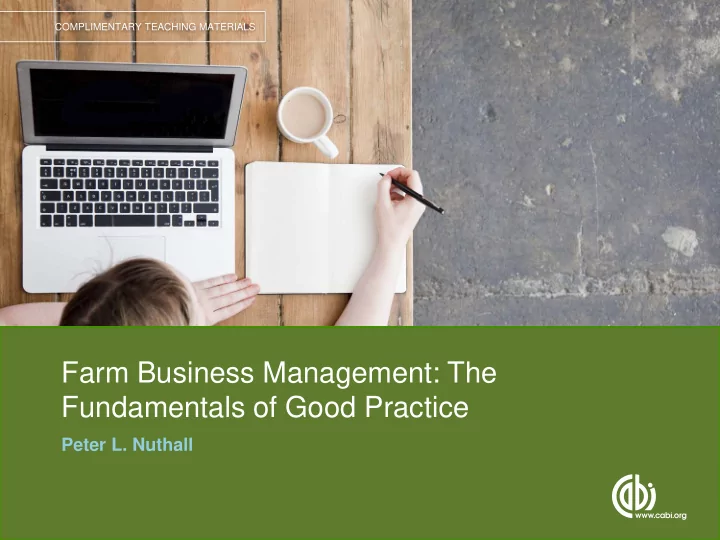

COMPLIMENTARY TEACHING MATERIALS Farm Business Management: The Fundamentals of Good Practice Peter L. Nuthall
Chapter 9 Skills Required COMPLIMENTARY TEACHING MATERIALS
LEARNING OBJECTIVES Discover the list of competencies, or skills, a farmer should have for managerial success. Learn about specific skills under three overarching groups: managerial attributes, entrepreneurial skills and personal attributes. Appreciate the importance of risk management, accurate and comprehensive observation, and accurate anticipation. Realize the significance of negotiation, planning, learning from experience, people skills and the successful implementation of plans. Reinforce the concepts introduced in the chapter through reading the views of two successful farmers and two prominent consultants. COMPLIMENTARY TEACHING MATERIALS
Skills Research Farmers, and consultants, were asked for their views (750 farmers, 350 consultants). What skills and competencies would a good manager have? Answers were common across farm types, ages and education. Accepted that the manager must have good technical skills even if just supervising and that jobs must be completed successfully and on time. Accepted that excellent technical knowledge is essential (e.g. expected fertilizer response). Skills and competencies can be grouped into managerial attributes, entrepreneurial skills and personal attributes. COMPLIMENTARY TEACHING MATERIALS
List Farmers Gave Regarding Skills and Attributes (Summaries) Managerial skill list essentially: observation, introspection and communication. Entrepreneurial skill list core items: meeting deadlines, obtaining correct decision support information, price negotiations, risk handling, anticipatory intuition. Personal attributes based on: good working relationships; ability to make early observations and to learn from experience; calmness; ability to assess situations and act quickly when required. COMPLIMENTARY TEACHING MATERIALS
Summary of Skills and Competencies Required (Combined From Farmers, Consultants, Literature) • Risk management. • Observation: good listening, reading and watching skills; knowledge of the information to record for good management (cost effective). • Negotiation abilities. • Anticipation: what and how for accuracy. • Planning abilities (correctness and coverage). • Learning from experience. • People skills. • Implementation of plans skills. • Generating ideas and solutions. • Analytical knowledge: understand decision logic and processes. COMPLIMENTARY TEACHING MATERIALS
The Voice of Experience: Two Farmers, Two Consultants (1) Two farmers suggested the following extra skills. – Margrave added: • knowing when to act; • a strong desire to be a good manager, to strive to improve; • enjoying working with people; • good communication skills; • an inquiring mind; an ability and desire to consult and discuss with others; • • ability to observe and understand new ideas and information; • having credibility with others involved and the right abilities COMPLIMENTARY TEACHING MATERIALS
The Voice of Experience: Two Farmers, Two Consultants (2) – Hank added: • having good computer skills; • envisaging outcomes from changes to plans and decisions; • confidence to act decisively. Two consultants made the following suggestions: – Bruce added: • ability to handle stress; • a competitive nature (e.g. improve beyond others); • excellent time management (e.g. prioritization skills). – Prof added: • knowing your own strengths and weaknesses; • having a passion for agriculture (e.g. primary production); an ability to be flexible and change when necessary. • COMPLIMENTARY TEACHING MATERIALS
Daunting The list of skills a farmer should have is extensive. Primary production involves just about every skill imaginable. Some managers are inherently good at most skills. Others need to work hard to improve. COMPLIMENTARY TEACHING MATERIALS
Thank You Name: First Surname Email: email@email.com COMPLIMENTARY TEACHING MATERIALS
Recommend
More recommend